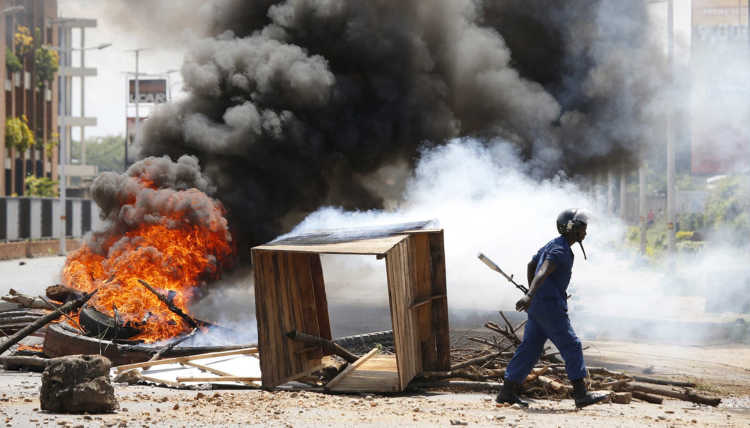In Brief | 10/02/2016
Burundi - "Not an Ethnic Conflict"
For the time being, the African Union does not want to send peacekeeping troops to Burundi to prevent an escalation of violence. Julia Grauvogel from the GIGA Institute of African Studies explains what the situation in Burundi is like.

The African Union’s (AU) security council initially wanted to send soldiers to Burundi, but then the heads of state decided against this at their meeting (…). How do you view this decision?
It’s unfortunate, but it’s not a surprise. It was always unclear whether such a force would really be deployed without the agreement of the Burundian government. The government has repeatedly rejected this as a foreign intervention and declared that it would fight the peacekeeping troops if necessary. It was never clear if the AU would risk initiating this kind of violent spiral.
Then why did the AU press ahead with its announcement in December?
The idea still hasn’t been completely ruled out. In the next few days the AU will send a high-ranking delegation to Bujumbura, the Burundian capital. Its aim will be to sound out whether it is actually possible to make the government view such a peacekeeping troop favourably. However, I see this as being out of the question. The peacekeeping force was always also a means of applying pressure, so that Burundi would agree to negotiations. There was an attempt to initiate talks, to be mediated by Uganda, between the Burundian government and the opposition.
How would peacekeeping soldiers contribute in Burundi at this point?
The plan was to send 5,000 soldiers to protect civilians. There has also since been talk of securing the borders, probably to get the government to agree. The violence in Burundi is taking place in various parts of the country; 5,000 soldiers wouldn’t be able to bring an end to it overnight.
Does this mean the AU force would primarily be a symbolic act?
If all 5,000 soldiers really were stationed in Bujumbura, they could provide security to a limited extent, but only if the government didn’t fight them. However, the AU’s decision also had symbolic value because the AU would be making use of the possibility, stipulated in Article 4 of its Constitutive Act, of sending in troops without the agreement of a government.
But wouldn’t the authorisation of the UN Security Council still be required?
Yes, but the UN works together with regional organisations such as the AU. In the past, the UN Security Council has in practice approved regional sanctions retroactively. In the case of Burundi, however, it has become apparent over the last few days that the UN is pushing for a political solution. A UN delegation travelled to Burundi and to talks with the AU, where it called for political measures. This was of course helpful to those AU members that are against sending a peacekeeping force.
How serious is the situation in Burundi at this time? Aid organisations are reporting mass graves.
The situation is very serious. In recent months political murders, rapes, and violence have continued to be carried out against civilians. The mass graves that have been discovered only confirm what was already known, which is that, according to human rights organisations, 150 people were killed last December in an attempted attack on an army base.
Does the violence again have an ethnic component stemming from the conflict between Hutus and Tutsis?
Not yet. On both sides – both in the government and among the opposition – politicians are trying to play the ethnic card in order to gain political capital. But the majority of the population is resisting these attempts to bring ethnicity into the conflict. The government, too, is trying to dispel the impression that a genocide is impending – at least to the outside world – because that would fuel the discussions about sending a peacekeeping force.
The 1994 genocide in Rwanda was planned and ordered from above. Could something like this also happen in Burundi?
Burundi itself has a long history of ethno-political violence. It is estimated that the massacres in 1972 claimed 300,000 victims, and there was an ethnically based civil war in the 1990s. Still, I think systematic, top-down violence against one ethnic group in all parts of the country is unlikely. Instead we’re seeing political “clean-up operations” with which the regime is attempting to get rid of its opponents. There is also the renewed threat of a slide into civil war: various rebel groups are forming, but there are no clear ethnic components.
How do you view the overall engagement of the African Union in curbing the conflict in Burundi?
The AU and the East African Community have been involved from the beginning, but they are divided internally. This was already evident in relation to the question of whether the Burundian president Pierre Nkurunziza was allowed to run for a third term in violation of the Burundian constitution. There are several heads of state within the AU’s ranks who would like to do away with term limits and pursue another term themselves. Additionally, a number of states reject an AU peacekeeping force on the grounds of national sovereignty, not least because human rights inside their own countries aren’t faring too well either. We’re not talking about exemplary democrats here.
The AU-appointed mediator for Burundi, Ugandan president Yoweri Museveni, didn’t attend the summit on the weekend. That doesn’t really demonstrate serious effort.
That doesn’t really demonstrate ideal coordination. In addition, it has been said of some countries that they side with the regime, and of others that they side with the opposition. This also makes a consistent regional position difficult.
The AU was launched in 2002 with the stated aim of finding African solutions to African conflicts. Has it managed to do this so far?
That depends on the type of conflict. In the case of military coups, the AU has established a sanctions practice that has definitely been successful: in several cases it has led to talks and, subsequently, new elections. So, in this respect it has lived up to its purpose. In other areas, however – for instance, human rights – the picture is completely different.
Tillmann Elliesen conducted the interview which originally appeared in welt-sichten.
